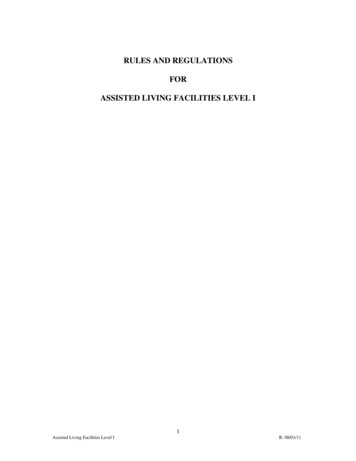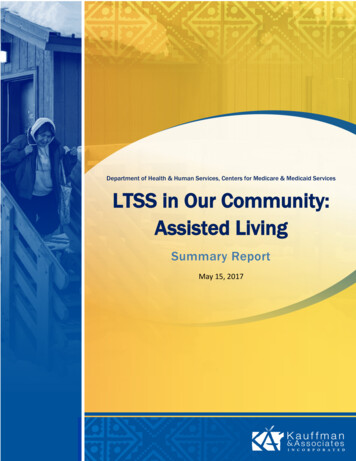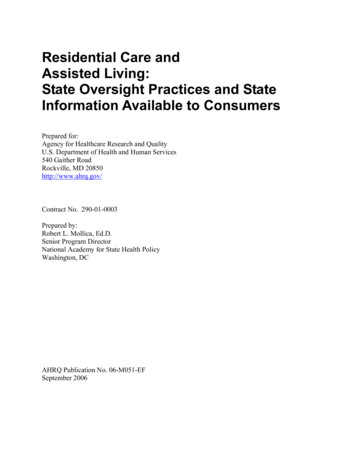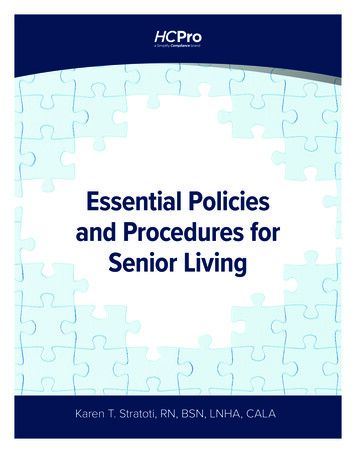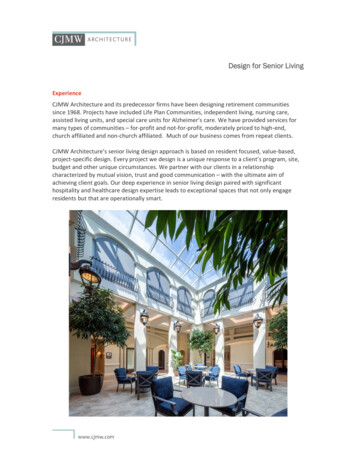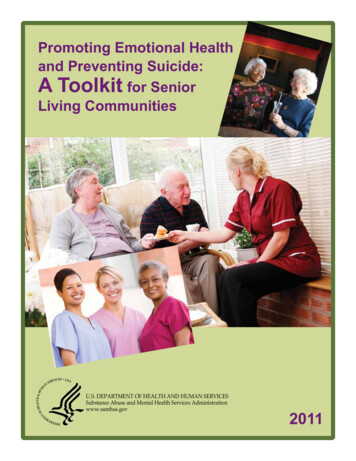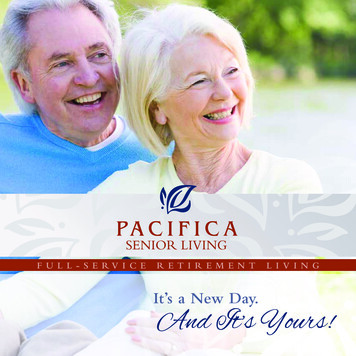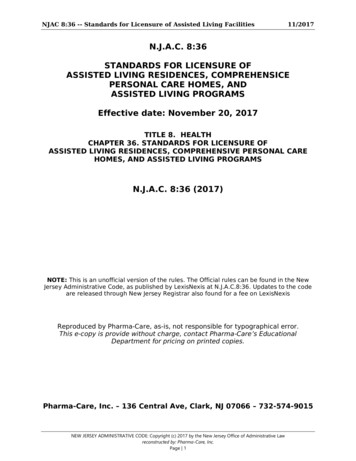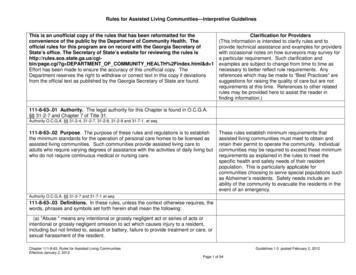
Transcription
Rules for Assisted Living Communities—Interpretive GuidelinesThis is an unofficial copy of the rules that has been reformatted for theconvenience of the public by the Department of Community Health. Theofficial rules for this program are on record with the Georgia Secretary ofState’s office. The Secretary of State’s website for reviewing the rules ishttp://rules.sos.state.ga.us/cgibin/page.cgi?g DEPARTMENT OF COMMUNITY HEALTH%2Findex.html&d 1Effort has been made to ensure the accuracy of this unofficial copy. TheDepartment reserves the right to withdraw or correct text in this copy if deviationsfrom the official text as published by the Georgia Secretary of State are found.Clarification for Providers(This information is intended to clarify rules and toprovide technical assistance and examples for providerswith occasional notes on how surveyors may survey fora particular requirement. Such clarification andexamples are subject to change from time to time asnecessary to better reflect rule requirements. Anyreferences which may be made to “Best Practices” aresuggestions for raising the quality of care but are notrequirements at this time. References to other relatedrules may be provided here to assist the reader infinding information.)111-8-63-.01 Authority. The legal authority for this Chapter is found in O.C.G.A.§§ 31-2-7 and Chapter 7 of Title 31.Authority O.C.G.A. §§ 31-2-4, 31-2-7, 31-2-8, 31-2-9 and 31-7-1, et seq.111-8-63-.02 Purpose. The purpose of these rules and regulations is to establishthe minimum standards for the operation of personal care homes to be licensed asassisted living communities. Such communities provide assisted living care toadults who require varying degrees of assistance with the activities of daily living butwho do not require continuous medical or nursing care.These rules establish minimum requirements thatassisted living communities must meet to obtain andretain their permit to operate the community. Individualcommunities may be required to exceed these minimumrequirements as explained in the rules to meet thespecific health and safety needs of their residentpopulation. This is particularly applicable forcommunities choosing to serve special populations suchas Alzheimer’s residents. Safety needs include anability of the community to evacuate the residents in theevent of an emergency.Authority O.C.G.A. §§ 31-2-7 and 31-7-1 et seq.111-8-63-.03 Definitions. In these rules, unless the context otherwise requires, thewords, phrases and symbols set forth herein shall mean the following:(a) "Abuse " means any intentional or grossly negligent act or series of acts orintentional or grossly negligent omission to act which causes injury to a resident,including but not limited to, assault or battery, failure to provide treatment or care, orsexual harassment of the resident.Chapter 111-8-63, Rules for Assisted Living CommunitiesEffective January 2, 2012Guidelines 1.0 posted February 2, 2012Page 1 of 94
Rules for Assisted Living Communities—Interpretive Guidelines(b) "Activities of daily living" means bathing, shaving, brushing teeth, combing hair,toileting, dressing, eating, walking, transferring from place to place, laundering,cleaning room, managing money, writing letters, shopping, using publictransportation, making telephone calls, grooming, obtaining appointments, engagingin leisure and recreational activities, or other similar activities.Activities of daily living are the routine things that onedoes to live a healthy and safe life.(c) "Administrator" means the manager designated by the Governing Body asresponsible for the day-to-day management, administration and supervision of theassisted living community, who may also serve as the on-site manager andresponsible staff person except during periods of his or her own absence.(d) “Applicant” means an individual or entity that submits an application forlicensure pursuant to these rules as described below:1. When the assisted living community is owned by a sole proprietorship, theindividual proprietor must be the applicant for the license, complete the statement ofresponsibility and serve as the licensee;2. When the assisted living community is owned by a partnership, the generalpartners must be the applicant for the license, complete the statement ofresponsibility and serve as the licensee;3. When the assisted living community is owned by an association, limited liabilitycompany (LLC), the governing body of the association or LLC must authorize theapplication for the license, complete the statement of responsibility and serve as thelicensee; and4. When the assisted living community is owned by a corporation, the governingbody of the corporation must authorize the application for the license, complete thestatement of responsibility and serve as the licensee.Chapter 111-8-63, Rules for Assisted Living CommunitiesEffective January 2, 2012Guidelines 1.0 posted February 2, 2012Page 2 of 94
Rules for Assisted Living Communities—Interpretive Guidelines(e) “Assistive device” means a device that may restrain movement which has beendetermined to be required by a licensed physician, nurse practitioner or physician’sassistant working under a protocol or job description respectively and is applied forprotection from injury or to support or correct the body alignment of the person, , forthe treatment of a person’s physical condition, and may only be used as a treatmentintervention where a specific written plan of care has been developed and theresident consents to such use.There must be a medical order, a specific written plan ofcare detailing how the assistive device is to be used,released, etc. and the resident must consent to the useof the assistive device.(f) “Assisted living care” means the specialized care and services provided by anassisted living community which includes the provision of personal services, theadministration of medications by a certified medication aide and the provision ofassisted self preservation.In order to qualify to be licensed as an assisted livingcommunity, the community must offer1. personal services,2. administration of medications by certified medicationaides and3. assisted self-preservation.(g) “Assisted living community” or “community” means a personal care homeserving 25 residents or more that is licensed by the department to provide assistedliving care.Personal care homes with 25 or more beds have theoption of deciding whether they want to apply tobecome licensed under the Assisted Living CommunityRules. However, if the home offers assisted living careas defined in these rules, it must be licensed as anassisted living community.Chapter 111-8-63, Rules for Assisted Living CommunitiesEffective January 2, 2012Guidelines 1.0 posted February 2, 2012Page 3 of 94
Rules for Assisted Living Communities—Interpretive Guidelines(h) “Assisted self-preservation” means the capacity of a resident to be evacuatedfrom an assisted living community to a designated point of safety and within anestablished period of time as determined by the Office of Fire Safety Commissioner.Assisted self-preservation is a function of all of the following: (A) the condition of theindividual, (B) the assistance that is available to be provided to the individual by thestaff of the assisted living community; and (C) the construction of the building inwhich the assisted living community is housed, including whether such buildingmeets the state fire safety requirements applicable to an existing health careoccupancy.The community’s ability to provide assisted selfpreservation to any particular resident requires thecommunity to take into account:1. the condition of the individual resident,2. the ALC staff available to provide assistance, AND3. the construction of the building and what fire safetyrequirements it meets.“Existing health care occupancy” means that thebuilding has been issued a certificate of occupancyapproving it for a limited healthcare occupancy underthe health care occupancy requirements existing at thetime of the application. For further information, checkwith the State Fire Marshal's .aspx(i) "Chemical Restraint" means a psychopharmacologic drug that is used fordiscipline or convenience and not required to treat medical symptoms.(j) "Criminal records check" means a search as required by law of the recordsmaintained by law enforcement authorities to determine whether the applicant forlicensure or employment has a criminal record as defined in O.C.G.A §§ 31-2-9 and31-7-250 as applicable.(k) "Criminal record" means any of the following:1. conviction of a crime; or2. arrest, charge, and sentencing for a crime where:(i) a plea of nolo contendere was entered to the charge; or(ii) first offender treatment without adjudication of guilt pursuant to the charge wasgranted; or(iii) adjudication or sentence was otherwise withheld or not entered on the charge;orChapter 111-8-63, Rules for Assisted Living CommunitiesEffective January 2, 2012Guidelines 1.0 posted February 2, 2012Page 4 of 94
Rules for Assisted Living Communities—Interpretive Guidelines(iv) arrest and being charged for a crime if the charge is pending, unless the timefor prosecuting such crime has expired pursuant to O.C.G.A. § 17-3-1 et seq.(l) "Department" means the Department of Community Health of the State ofGeorgia operating through the Division of Healthcare Facility Regulation.Division of Healthcare Facility Regulation, DCH, 2Peachtree Street, NW, Suite 31.447. Atlanta, Ga.,30303, 404-657-5850(m) "Director" means the chief administrator, executive officer or manager.(n) "Disabled individual" means an individual that has a physical or mentalimpairment that substantially limits one or more major life activities and who meetsthe criteria for a disability under state or federal law.(o) "Employee" means any person, other than a director, utilized by an assistedliving community to provide personal services to any resident on behalf of theassisted living community or to perform at any facilities of the assisted livingcommunity any duties which involve personal contact between that person and anypaying resident of the assisted living community.An individual need not receive monetary compensationto meet the definition of an employee.(p) “Exploitation” means an unjust or improper use of another person or theperson’s property through undue influence, coercion, harassment, duress,deception, false representation, false pretense, or other similar means for one’s ownpersonal advantage.(q) "Fingerprint records check determination" means a satisfactory orunsatisfactory determination by the Department based upon a records checkcomparison of Georgia Crime Information Center (GCIC) information withfingerprints and other information in a records check application.(r) "Governing Body" means the owner, , the board of trustees or directors, thepartnership, the corporation, the association, the sole proprietorship or the person orgroup of persons who maintains and controls the assisted living community and whois legally responsible for the operation of the community.Chapter 111-8-63, Rules for Assisted Living CommunitiesEffective January 2, 2012Guidelines 1.0 posted February 2, 2012Page 5 of 94
Rules for Assisted Living Communities—Interpretive Guidelines(s) “Health maintenance activities” means those limited activities that, but for adisability, a person could reasonably be expected to do for himself or herself. Suchactivities are typically taught by a registered professional nurse, but may be taughtby an attending physician, advanced practice registered nurse, physician assistant,or directly to a patient and are part of ongoing care. Health maintenance activitiesare those activities that do not include complex care such as administration ofintravenous medications, central line maintenance, and complex wound care; do notrequire complex observations or critical decisions; can be safely performed andhave reasonably precise, unchanging directions; and have outcomes or results thatare reasonably predictable. Health maintenance activities conducted pursuant tothis paragraph shall not be considered the practice of nursing.Health maintenance activities may be performed bydesignated proxy caregivers. An assisted livingcommunity must decide and disclose whether itprovides designated proxy caregivers as a service orwill permit residents to engage their own proxycaregivers to come into the community to performhealth maintenance activities.(t) “Health services” means the specialized assistance that may be provided by orat the direction of either licensed healthcare professionals, such as doctors, nurses,physical therapists or through licensed healthcare programs, such as home healthagencies, hospices and private home care providers to address health needs thatthe assisted living community is not staffed to provide or is not authorized by law orregulations to provide.(u) “Injury” as used in the definition of “abuse” means a wrong or harm caused byan individual to a resident which is manifested by a physical or behavioral reactionor change in the appearance or actions of the resident, such as, but not limited to,reddened or bruised skin not related to routine care, crying, startling or coweringreaction by the resident and malnutrition or pressure ulcers for which the facility hasnot provided proper care.Example of an injury: A worker intentionally slaps aresident across the face to get the resident to do orstop doing something. The resident is observed to cryout and appears startled or upset.(v) "Legal Surrogate" means a duly appointed person who is authorized to act,within the scope of the authority granted under the legal surrogate's appointment, onbehalf of a resident who is adjudicated incapacitated.(w) “Licensed Residential Care Profile” means the form made available by theDepartment which the assisted living community must use to inform the public aboutthe services it provides.Once this Profile form is loaded on the HealthcareFacility Regulation Division link at the , DCH website atwwww.dch.ga.gov, the community will need to completethe Profile on line. In the interim, the community maydownload the form, complete it and make it available toresidents, potential residents and their families.Chapter 111-8-63, Rules for Assisted Living CommunitiesEffective January 2, 2012Guidelines 1.0 posted February 2, 2012Page 6 of 94
Rules for Assisted Living Communities—Interpretive Guidelines(x) "Local law enforcement agency" means a local law enforcement agency withauthorization to conduct criminal history background checks through the GeorgiaCrime Information Center (GCIC).(y) "Medical services" means services which may be provided by a personlicensed pursuant to Article II of Chapter 34 of Title 43 of the Official Code ofGeorgia Annotated.(z) “Memory care services” means the additional watchful oversight systems anddevices that are required for residents who have cognitive deficits which may impactmemory, language, thinking, reasoning, or impulse control, and which place theresidents at risk of eloping, i.e. engaging in unsafe wandering activities outside theassisted living community.Where a community does not have a special memorycare unit, the community must still have systems inplace to provide watchful oversight for those residentsdetermined to have developed cognitive deficits whichplace the residents at risk of eloping. See Rule 111-863-.18(aa) “Memory care unit” means the assisted living community or specialized unit,thereof, that either holds itself out as providing additional or specialized care topersons with diagnoses of probable Alzheimer’s Disease or other dementia whomay be at risk of engaging in unsafe wandering activities outside the unit or assistedliving community (eloping) or charges rates in excess of those charged otherresidents because of cognitive deficits which may place the residents at risk ofeloping.See Rule 111-8-63-.19(bb) "Non-Family Adult" means a resident 18 years of age or older who is notrelated by blood within the third degree of consanguinity or by marriage to theperson responsible for the management of the assisted living community or to amember of the governing body.Third degree of consanguinity means mother, father,grandmother, grandfather, great grandmother, greatgrandfather, sister, brother, daughter, son,granddaughter, grandson, aunt, uncle, great aunt, greatuncle, niece, nephew, grand niece, grand nephew, firstcousins, first cousins once removed and secondcousins.By marriage includes spouse.(cc) "Nursing services" means those services which may be rendered by a personlicensed pursuant to Articles I and 2 of Chapter 26 of Title 43 of the Official Code ofGeorgia Annotated.Chapter 111-8-63, Rules for Assisted Living CommunitiesEffective January 2, 2012Guidelines 1.0 posted February 2, 2012Page 7 of 94
Rules for Assisted Living Communities—Interpretive Guidelines(dd) "On-site manager" means the administrator or person designated by theadministrator as responsible for carrying out the day-to-day management,supervision, and operation of the assisted living community, who may also serve asresponsible staff person except during periods of his or her own absence.(ee) “Owner” means any individual or any person affiliated with a corporation,partnership, or association with 10 percent or greater ownership interest in thebusiness or agency licensed as an assisted living community and who:1. purports to or exercises authority of an owner in the business or agency; or2. applies to operate or operates the business or agency; or3. maintains an office on the premises of the assisted living community; or4. resides at the assisted living community; or5. has direct access to persons receiving care at the assisted living community; or6. provides direct personal supervision of assisted living community personnel bybeing immediately available to provide assistance and direction during the time suchassisted living community services are being provided; or7. enters into a contract to acquire ownership of such a business or agency.(ff) "Permit" or “license” means the authorization granted by the Department to thegoverning body to operate an assisted living community.(gg) "Personal care home" means any dwelling, whether operated for profit or not,which undertakes through its ownership or management to provide or arrange forthe provision of housing, food service, and one or more personal services for two ormore adults who are not related to the owner or administrator by blood or marriage.(hh) "Personal Services" includes, but is not limited to, individual assistance withor supervision of self-administered medication, assistance, essential activities ofdaily living such as eating, bathing, grooming, dressing, toileting, ambulation andtransfer.Chapter 111-8-63, Rules for Assisted Living CommunitiesEffective January 2, 2012Guidelines 1.0 posted February 2, 2012Page 8 of 94
Rules for Assisted Living Communities—Interpretive Guidelines(ii) “Proxy caregiver” means an unlicensed person who has been selected by adisabled individual or a person legally authorized to act on behalf of such individualto serve as such individual’s proxy caregiver, provided that such person shallreceive training and shall demonstrate the necessary knowledge and skills toperform documented health maintenance activities, including specialized proceduresfor such individual.A community needs to decide and disclose whether itprovides proxy caregivers or permits the residents toemploy independent proxy caregivers.(jj) "Physical Restraints" are any manual or physical device, material, or equipmentattached or adjacent to the resident's body that the individual cannot remove easilywhich restricts freedom or normal access to one's body. Physical restraints include,but are not limited to, leg restraints, arm restraints, hand mitts, soft ties or vests, andwheelchair safety bars. Also included as restraints are assisted living communitypractices which function as a restraint, such as tucking in a sheet so tightly that abedbound resident cannot move, bedrails, or chairs that prevent rising, or placing awheelchair-bound resident so close to a wall that the wall prevents the resident fromrising. Wrist bands or devices on clothing that trigger electronic alarms to warn staffthat a resident is leaving a room do not, in and of themselves, restrict freedom ofmovement and should not be considered as restraints.(kk) "Plan of Correction" means the written plan prepared in response to cited ruleviolations that identifies by date certain the specific actions that will be taken by theassisted living community to come into compliance with these rules.(ll) "Representative" means a person who voluntarily, with the resident's writtenauthorization, acts upon resident's direction with regard to matters concerning thehealth and welfare of the resident, including being able to access personal andmedical records contained in the resident's file and receive information and noticespertaining to the resident's overall care and condition. This written authorizationmay take the form of an advance directive.(mm) "Resident" means any non-family adult who receives or requires assistedliving care and resides in the assisted living community.An adult is someone 18 years of age or older.(nn) "Responsible Staff Person" means the employee designated by theadministrator or on-site manager as responsible for supervising the operation of theassisted living community during periods of temporary absence of the administratoror on-site manager.Chapter 111-8-63, Rules for Assisted Living CommunitiesEffective January 2, 2012Guidelines 1.0 posted February 2, 2012Page 9 of 94
Rules for Assisted Living Communities—Interpretive Guidelines(oo) "Satisfactory records check determination" means a written determination thata person for whom a records check was performed was found to have no criminalrecord as defined in O.C.G.A. § 31-7-250 or O.C.G.A. § 31-2-9 as applicable.(pp) “Self-administration of medications” or “self-administered medications” meansthose prescription or over-the-counter drugs that the resident personally chooses toingest or apply where the resident has been assessed and determined to have thecognitive skills necessary to articulate the need for the medication and generallyknows the times, and physical characteristics of medications to be taken.“Self-administration” means the resident has anawareness of self that allows the resident to questionwhether a different-colored medication is the rightmedication. The resident can generally tell you whatthe medication is for, when it is to be taken, candescribe the physical characteristics of the medicationand tell you if he or she is experiencing physicalsymptoms (weak, dizzy, etc.) that might be indicative ofan adverse drug reaction(qq) "Self-preservation" means the ability to respond to an emergency condition,whether caused by fire or otherwise, and escape the emergency without physical,hands-on assistance from staff. The resident may move from place to place bywalking, either unaided or aided by prosthesis, brace, cane, crutches, walker orhand rails, or by propelling a wheelchair.(rr) “Staff” means any person who performs duties in the assisted living communityon behalf of the assisted living community.(ss) "Unsatisfactory criminal history background check determination" means awritten determination that a person for whom a records check was performed has acriminal record which indicates an arrest, charge or conviction of one of the coveredcrimes outlined in O.C.G.A. § 31-7-250 et seq., or as outlined in O.C.G.A. § 31-2-14.Authority O.C.G.A. §§ 31-2-7, 31-2-8, 31-2-9, 31-7-1 et seq. and 43-26-12.111-8-63-.04 Exemptions. These regulations do not apply to the followingfacilities:(a) boarding homes or rooming houses which provide no services other thanlodging and meals;Chapter 111-8-63, Rules for Assisted Living CommunitiesEffective January 2, 2012Guidelines 1.0 posted February 2, 2012Page 10 of 94
Rules for Assisted Living Communities—Interpretive Guidelines(b) facilities offering temporary emergency shelter, such as those for the homelessand victims of family violence;(c) other facilities, homes or residences licensed by the department which havenot been classified as assisted living communities, e.g. community livingarrangements, personal care homes, hospices, traumatic brain injury facilities;(d) facilities providing residential services for federal, state or local correctionalinstitutions under the jurisdiction of the criminal justice system;(e) charitable organizations providing shelter and other services without chargingany fee to the resident or billing any fee on behalf of the residents;(f) group residences organized by or for persons who choose to live independentlyor who manage their own care and share the cost of services including but notlimited to attendant care, transportation, rent, utilities and food preparation;(g) facilities licensed by the Department of Behavioral Health, DevelopmentalDisabilities and Addictive Diseases; or(h) host homes as defined in O.C.G.A. §37-1-20(18).NOTE: Community Living Arrangements exclusivelyserve consumers of DBHDD services only and mustcomply with a different set of rules. See Rules andRegulations for Community Living Arrangements,Chapter 290-9-37.For this exemption to be applicable, the residents mustindependently arrange or manage their own care. If thecare is arranged or managed by the owner or manageror staff of the building/home/community, then thisexemption does not apply. The provision of housingplus one or more personal services requires a personalcare home (or other licensed facility) permit. To fallwithin this exemption, the ownership cannot beproviding housing and one or more personal services.DBHDD licenses crisis stabilization units which areexempt from these rules.These homes serve clients of DBHDD.Authority O.C.G.A. §§. 31-2-7, 31-2-8, 31-7-1 et seq. ,37-1-20 and 37-1-29.111-8-63-.05 Application for Permit.(1) The governing body of each assisted living community must submit to theDepartment an application for a permit in order to operate.(2) The application for a permit must be made on forms made available by theDepartment or in a format acceptable to the Department.Application forms are made available for downloadingon the HFRD web site at www.dch.ga.gov under Formsand Applications.Chapter 111-8-63, Rules for Assisted Living CommunitiesEffective January 2, 2012Guidelines 1.0 posted February 2, 2012Page 11 of 94
Rules for Assisted Living Communities—Interpretive Guidelines(3) No application for licensure will be acted upon by the Department unless it hasbeen determined to be complete and include all required attachments and fees duethe Department as specified in the Rules and Regulations for General Licensing andEnforcement Requirements, Chapter 111-8-25.(4) Each application for a permit must be accompanied by an accurate floor planshowing windows, doors, common areas, and resident room measurements anddigital copies in .jpg format of pictures of the assisted living community’s exterior,common areas and typical resident room .The Rules and Regulations for Enforcement of GeneralLicensing and Enforcement Requirements, Chapter111-8-25, are available on the HFRD web site atwww.dch.ga.gov. Click on Healthcare FacilityRegulation, then Forms and Applications, thenLicensing Forms, then scroll down to Assisted LivingCommunities Application Package.If multiple buildings, the sketch must include a sketch ofthe grounds with all buildings identified.If multiple stories, the floor sketch must include all floorsand all rooms regardless of whether they will beoccupied by residents or not.Required pictures in .jpg format clearly identifyingportions of the community must be attached to an emailwith a subject line: Application of (Name ofCommunity and FAC ID. Include address of communityin body of email, attach .jpg picture files and send toFacPictures@dhr.state.ga.us (email box address).PLEASE DO NOT EMAIL PHOTOS UNTIL YOU HAVEOBTAINED YOUR NEW ALC FAC ID AND CANINCLUDE THE NEW ALC FAC ID IN THE SUBJECTLINE OF THE EMAIL.(5) The name of the administrator or on-site manager, who will be working in theassisted living community, if known, must be included with the application for apermit. If such information is not known at the time of application, it must beprovided to the Department before a permit will be issued.Chapter 111-8-63, Rules for Assisted Living CommunitiesEffective January 2, 2012Guidelines 1.0 posted February 2, 2012Page 12 of 94
Rules for Assisted Living Communities—Interpretive Guidelines(6) The ownership of the assisted living community must be fully disclosed in theapplication for a permit. In the case of corporations, partnerships, and other entitiesrecognized by statute, the corporate officers and all other individuals or familygroups owning ten percent or more of the corporate stock or ownership must bedisclosed in the application, as well as the registered agent for service of process.(7) Each application must include documentation of ownership or lease agreementfor the property on which the assisted living community will be operated.(8) The filing of an application for licensure constitutes a representation that theapplicant is or will be in complete control of the community as of a specified date.(9) Local zoning and other local requirements regarding the proper location andestablishment of the assisted living community must be addressed by the applicantwith the responsible local officials.A list of individual owners (persons) who have anyinvolvement with the operation of the community mustalso be submitted to ensure that those owners whorequire criminal records checks under the law get them.See the legal definition of “owner” in Rule 111-8-63.03(ee).Applicant must provide
3. When the assisted living community is owned by an association, limited liability company (LLC), the governing body of the association or LLC must authorize the application for the license, complete the statement of responsibility and serve as the licensee; and 4. When the assisted living
